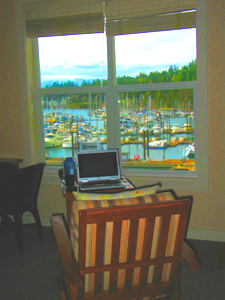After regrouping, analyzing, editing, and brainstorming my first 120 pages, I come to four possible conclusions:
1. My story sucks, and I don’t know what I’m doing.
2. I’ve mastered just enough fiction craft to be my own worst enemy.
3. I’m not trusting the process.
4. I’ve got it going on, no worries.
Even I know point one is too negative. At the other end of the spectrum, point four isn’t realistic either. That leaves points two and three, both of which have merit.
Point two: I’ve mastered just enough fiction craft and technique to be my own worst enemy.
I used to muscle my way through what Anne Lamott calls the “shitty first draft” in her book Bird by Bird: Some Instuctions on Writing and Life. Here’s what she says on page 22:
The first draft is the child’s draft, where you let it all pour out and then let it romp all over the place, knowing that no one is going to see it and you can shape it later.
Somewhere along the line, however, I grew out of this 100% organic writing method. As my writing group would gladly confirm, when I let the prose flow too well I end up with 500 pages and too many plotlines and a big mess.
These days, I’d rather end up with, say, a teenager’s draft — or, a semi-mature story. I’d like to avoid revising for years. To this end, these days, I have enough craft under my belt to consider many things at once while I’m writing — things such as subplots and set-up and pacing.
The downside is that all this awareness gets me thinking TOO much. (A nasty little habit of mine as my family would gladly confirm.) Let’s label point two in terms my ex-therapist would understand: analysis paralysis.
Point three: I’m not trusting the process.
I’ve heard many writers over the years advise us younger writers to “trust the process.” I’m a big fan of trusting the process. However, how do I trust that which I’m still trying to nail down? I’ve grown out of muscling through first drafts with only my right brain (the dreamy side versus the analytical side on the left). Unfortunately, I haven’t discovered my own best process yet. I’m still experimenting.
Some writers advocate outlining the whole novel up front, which is the opposite of Lamott’s strategy. But outlining isn’t for me either. I think you need to be a naturally organized person to write outlines. I’m somewhere in the murky middle place, and since I don’t have a tried-and-true process (yet) I’m currently having trust issues.
Sigh.
So, my final conclusion? In the world of fiction, I’m not yet a mature writer; I’m more like a teenager experiencing massive growing pains. Thankfully, I survived my actual adolescence somewhat intact; I’m sure I’ll survive this first draft, too.
Meanwhile, am I too old to throw a hissy-fit, slam the bedroom door, and turn my head-banger music up too loud?
 How goes my impulsive and self-imposed writer’s retreat, you ask?
How goes my impulsive and self-imposed writer’s retreat, you ask?


